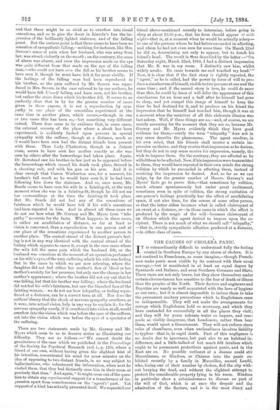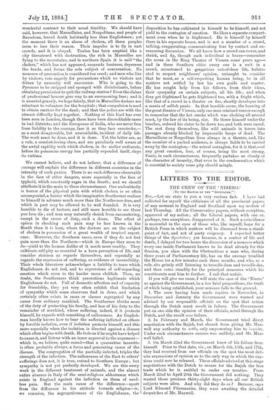THE CAUSES OF CHOLERA PANIC.
IT is extraordinarily difficult to understand fully the feeling created in Southern Europe by any alarm of cholera. It is not confined to Frenchmen, as some imagine,—though French- men make panic most visible by its contrast with their usual courage,—but is manifested in at least an equal degree by Spaniards and Italians, and even Southern Germans and Slays. These races are not only brave, but they show themselves under certain circumstances less sensitive to the fear of death or illness than the peoples of the North. Their doctors and engineers and Deputies are nearly as well acquainted with the laws of hygiene as our own ; but it is almost impossible to induce them to take the permanent sanitary precautions which to Englishmen seem so indispensable. They will not make the arrangements for sewage which Englishmen hold so necessary, and which they have contended for successfully in all the places they visit; and they will for years tolerate water so impure, and cess- pools so visibly dangerous, that Londoners, rather than bear them, would upset a Government. They will not enforce stern rules of cleanliness, even when uncleanliness involves liability to typhus—that is, to rapid death. Part of this negligence is no doubt due to ignorance, but part also to an habitual in- difference, and a little-talked-of but much felt fatalism which ought to be permanent protections against panic, and in the East are so. No possible outburst of a disease could stir Mnssulmans, or Hindoos, or Chinese into the panic ex- hibited recently by a family in Marseilles, named Lenfle, who, losing one of their number by cholera, fled the city with- out burying the dead, and without the slightest attempt to protect the considerable property lying in his room. Hindoos in particular show a submissiveness to disease as part of the will of God, which is at • once the despair and the admiration of the doctors, and is in the most direct and wonderful contrast to their usual timidity. We should have said, however, that Marseillaise, and Neapolitans, and people of Barcelona, feared death habitually less than Englishmen ; yet the moment there is an alarm of cholera, all these peoples seem to lose their reason. Their impulse is to fly in vast crowds, and it is obeyed. Toulon has been emptied like a city threatened with destruction, the rich in Marseilles are flying to the mountains, and in northern Spain it is said " the cholera," which has not appeared, suspends business, depresses the funds, and forms the sole subject of conversation. No measure of prevention is considered too cruel; and men who live by visitors, vote eagerly for precautions which no visitors not driven by necessity will encounter. Who is going to the Pyrenees to be stripped and sponged with disinfectants, before -obtaining permission to quit the railway station P Even the claims ,of professional honour give way to an unreasoning fear; and it is asserted gravely, we hope falsely, that in Marseilles doctors are reluctant to volunteer for the hospitals ; that compulsion is used to obtain carriers for the dead ; and that the police are with the utmost difficulty kept together. Nothing of this kind has ever been seen in London, though there have been discreditable cases in bad districts ; and the Europeans of India, who are never free from liability to the scourge, face it as they face sunstroke,— as a most disagreeable, but unavoidable, incident of daily life. The work must be done, and it is done. Yet the latter are, as a rule, a comfort-loving class, and are peculiarly well aware of the awful rapidity with which cholera, in its earlier outbursts, before its poisonous energy has partially expended itself, slays its victims.
We cannot believe, and do not believe, that a difference of courage will explain the difference in different countries in the intensity of such panics. There is no such difference observable in the face of other dangers, more especially in the face of typhoid, which constantly rages in the South ; and we should attribute it in the main to three circumstances. One undoubtedly is horror of the physical pain with which cholera is so often accompanied, a horror which the imaginative Southerner realises to himself in advance much more than the Northerner does, and which in part may be allowed to be well founded. It is very horrible to die of torture, and still more horrible to see those you love die ; and men may naturally shrink from encountering, except in the cause of duty, such a doom. The effect of opium in checking such pain may be less known in the South than it is here, where the doctors are on the subject 'of cholera in possession of a great wealth of tropical experi- ence. Moreover, the Southern races, even if they do not feel
pain more than the Northern—which in Europe they seem to do—yield to the human dislike of it much more readily. They cultivate self-pity as essential to a keen perception of life, and consider stoicism as regards themselves, and especially as regards the expression of suffering, as evidence of insensibility. Their whole literature acknowledges a liability to tears which Englishmen do not feel, and to expressions of self-regarding emotion which seem to the harder races childish. Then, no doubt, the Southerners think precautions legitimate which Englishmen do not. Full of domestic affection and of capacity for friendship, they yet very often exhibit that limitation of sympathy which some observers find in Jews, and which certainly often exists in races or classes segregated by any cause from ordinary mankind. The Southerner thinks more of the duty of protecting his family, and less of his duty to the remainder of mankind, whose suffering, indeed, if it protects himself, he regards with something of callousness. An English- man hardly knows how to bear the suffering inflicted on others by forcible isolation, even if isolation protects himself, and this more especially when the isolation is directed against a disease which often begins with death. He feels as if he might have helped to cause it, and listens with an inner approval to the argument— which is, we believe, quite sound—that a quarantine lazaretto is often, probably always, a focus and generating cause of the disease. The congregation of the partially-infected, triples the strength of the infection. The callousness of the East to others' sufferings does not, it is true, extend to Southern Europe ; but sympathy is not yet perfectly developed. We see this every week in the different treatment of animals, and the almost entire absence in Italy of the semi-religious. abhorrence which
e o .exists in England against the infliction n them of need- less pain. But the main cause of the difference—apart from the difference in his attitude towards religion—is, we conceive, the aegregativeness of the Englishman, the disposition he has cultivated in himself to be himself, and not yield to the contagion of emotion. He likes a separate compart- ment even when he is frightened. He is himself by himself there in his separate house, and is not a member of a crowd, talking, exaggerating, communicating fear by contact and un- reasoning discussion. We all know how a crowd can cower, and shriek, and fly, though each individual is brave—remember the scene in the Ring Theatre of Vienna some years ago— and in these Southern cities every one is a unit in a crowd, accustomed to gregarious out-of.door life, habitu- ated to respect neighbours' opinion, untaught to consider that he must, as a self-respecting human being, be in all matters not settled by law his own guide and master. He has sought help from his fellows, from their ideas, their sympathy on certain subjects, all his life ; and when they get frightened he gets frightened too, with a fright which, like that of a crowd in a theatre on fire, shortly developes into a mania of selfish panic. In that horrible scene, the burning of the great theatre of Vienna, only one man retained reason enough to remember that the hot smoke which was choking all around must, by the law of its being, rise. He threw himself under the benches, ordered his sister to lie down too, and both were saved. The rest flung themselves, like wild animals in terror, into passages already blocked by impassable heaps of dead. The Marseillaise or Neapolitan lives always in a theatre, and, like the member of a packed audience, is always liable to be carried away by the contagion,—the actual contagion, for it is that,—of any great emotion, fear, of course, being the most strong. Panic, in such circumstances, frequently partakes so closely of the character of insanity, that even in the condemnation which is essential to society some pity should mingle.

































 Previous page
Previous page